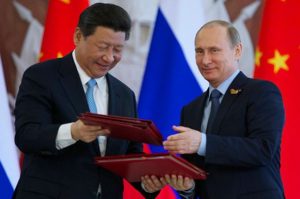Global human rights in retreat – Amnesty report
 Human rights are in freefall worldwide with the rise of dictatorial leadership across the globe, according to Amnesty International’s latest annual report.
Human rights are in freefall worldwide with the rise of dictatorial leadership across the globe, according to Amnesty International’s latest annual report.
The human rights group’s 2017-18 annual report says that world leaders are “undermining the rights of millions,” either by turning a blind eye to violations of human rights or by perpetrating them.
The report, covering 159 countries, focuses particularly on Philippines President Rodrigo Duterte whose anti-drug campaign has left thousands of people dead; Russian President Vladimir Putin whose government has tried anti-corruption protestors on “politically motivated charges;” and President Xi Jinping of China where Nobel Laureate Liu Xiaobo died in custody,
China has also introduced internet controls and “repression” conducted under ‘counter-terrorism’ campaigns remained “particularly severe” against the Uighur minority and Tibetans, the report said.
Amnesty claims there has been a lack of leadership on human rights, pointing to the “feeble response” to war crimes and crimes against humanity from Syria to South Sudan.
“Over the past year, leaders have pushed hate, fought against rights, ignored crimes against humanity, and blithely let inequality and suffering spin out of control. This provoked mass protests, showing that while our challenges may never be greater, the will to fight back is just as strong,” the report said.
“While the findings remain shocking, it is the events such as those highlighted in the report that galvanised people across the world to stand up in the face of adversity and make their voices heard,” it said.
It warned that the US had taken a step backward, saying that the Trump administration’s early attempts in 2017 to ban all citizens of several Muslim majority countries was “hateful,” and “set a dangerous precedent” for other governments to follow.
Amnesty Senior Director for Global Operations Minar Pimple, however, acknowledged that populism and the “politics of demonisation” is a trend that began before Trump took office.
Amnesty said Brexit and Turkey’s crackdown on dissent preceded the 2016 US election.
Across Europe, countries saw a gathering storm against refugees, migrants, and religious minorities and the use of counterterrorism measures “disproportionately restricting” rights in the name of security, the report said.
It said in 2017 France clamped down on protests and Poland threatened the independence of the judiciary.
The report said Hungry had “reached a new low” automatically detaining asylum seekers, in breach of EU law.
Germany, grappling with an influx of refugees from the Middle East and Afghanistan, reported more than 1,000 criminal offenses against refugees and asylum seekers, it said.
But the report said that the largest human tragedy of the past year has been in Myanmar in South East Asia.
It said the Burmese society was “encouraged to hate, scapegoat and fear minorities,” culminating in the military “ethnic cleansing” of Rohingya Muslims.
Rohingya fled the state of Rakhine, and streamed into Bangladesh in what was the fastest growing crisis of 2017. Estimates of the number of people displaced range from 655,000 to more than 800,000.
Across the globe, Amnesty said the past year showed what happens when the “politics of demonization become mainstream.”
The report said that in India religious minorities, especially Muslims, faced “increasing demonisation by hardline Hindu groups, pro-government media, and some state officials”.
The report said that, considered a beacon of democracy in the region was seeing the space for its civil society continue to shrink, as authorities used repressive laws to stifle dissent, and press freedoms came under increasing attack.
However, in Bangladesh there were hopeful signs in a year when the global human rights record deteriorated, the report said.
The tiny, impoverished South Asian nation welcomed the great mass of Rohingya refugees into the country. However, the report also says many of the refugees lived in squalid conditions, malnutrition was rife, and inadequate protection exposed woman and girls to heightened risk of sexual violence and human trafficking
The Amnesty report says the #MeToo campaign has elevated the issue of harassment and discrimination against women into a global phenomenon.
“Young people have showcased the growing influence of social movements, be it raising their voices against attacks on minorities in India or marching against gun violence in the United States,” the report said.
Secretary General of Amnesty International Salil Shetty said there was “a palpable sense that protest movements are on the rise globally”.
Laurie Nowell
AMES Australia Senior Journalist












